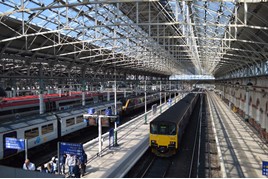- This Comment was published in RAIL 890 (October 23-November 5 2019).
Major Government decisions on railways are imminent that will have a profound impact on the UK economy, its social fabric nationwide, international prospects and regional social/economic health. The stakes surrounding the outcomes of the Williams Review and Oakervee HS2 study could not be higher.
It is alarming that these decisions are being taken in the era of post-truth politics, when protagonists on all sides of every debate are only too happy to say anything to further their case, regardless of fact. This makes a challenging and controversial debate much more difficult. It is all too important to risk making a mess of these far-reaching decisions.
The fact that there are separate debates about the outcome of Williams on the one hand and HS2 on the other is part of the problem. HS2 has always been considered as some kind of an add-on to the railway, when the reality is that this crucial piece of infrastructure is a key part of the network and needs to be planned and implemented as such. The idea that it’s an independent and high-speed railway connected to Network Rail at each end is a misleading notion. HS2 is finally getting its messaging right, but it has a long way to go to catch up.
Interestingly, the recent HS2 North Redesigning our Railways report does a great job of taking a holistic network view. It really is an excellent read and I would commend all RAIL readers (and the HS2 comms team!) to read it closely. This section in particular caught my eye: “Economic growth scenarios point to a potential aggregate gross value added prize for the North of £1,008bn between 2035 and 2050. If transport investment unlocks just 10% of this prize it would deliver £100bn.”
Those who argue that HS2 should be scrapped and its money spent on regional railways should pay heed to the report’s conclusions about the great potential of Northern Powerhouse Rail. For example, six hourly Manchester-Leeds services of less than 30 minutes would create a ‘virtual city’ across the Pennines, opening up considerable investment opportunities in the towns between.
But “…none of the benefits can be fully transformational without HS2,” concludes this report. It isn’t either/or. It’s both. This report is an object lesson in making that case.
This conclusion is also of fundamental importance: “Before a politically driven decision to cancel any element of HS2 in the North is taken, further work to piece together the economic impact on the North’s towns and cities needs to be brought forward with oversight devolved to Mayors and civic leaders - as it should also be for delivery over the coming three decades.”
Too often the North is told ‘This is what you’re getting’ rather than being asked ‘what is best for your region? - before commissioning experienced rail planners to deliver it. It’s the age-old problem with railway policy in both government and the industry - dictating inputs rather than identifying ideal outcomes.
The same principle applies to how a key aspect of the Williams Review will be delivered through a White Paper - which Government has promised to do, before any of us have even seen it. Inevitably, political imperatives dictate outcomes as being greater punctuality and reliability, value for money, simpler fares, accessibility - all the usual hot buttons. The burning platforms of failing franchises and a discredited fare structure mean that doing nothing is not an option. Radical changes will possibly involve concessions rather than franchises and more incentives/penalties to encourage better performance.
A core message is not only the undertaking of root-and-branch reform from 2020, but crucially a clear commitment by Government to give Northern leaders a greater say in how railways are run. As with the HS2 argument, however, Government is having to accept that the days of Whitehall (or a handful of indifferent Home Counties Conservative MPs) deciding and dictating what will happen in the North are long gone. Regional politics and influential and vocal (if not well-informed) Mayors are combining to give the North a powerful voice which it did not have even five years ago. This creates the climate for more effective devolution, but it is not without dangers. For devolution to be effective you need suitably skilled and experienced people to devolve to, and certainly in railway terms the North has a lot of work to do here.
Scotland is a decade ahead in this respect with Transport Scotland. And when you look at Wales scrabbling to create similar skills, it’s clear to see just how much effort is required in the North before it can think about TS levels of expertise, insight and potential. Those who relentlessly criticise Northern rail services and demand they be handed over ought to be careful what they wish for. So yes, the North’s emerging voice must be respected, but
devolution must be carefully managed.
A major hazard would be the creation of large metropolitan areas of rail control where competing interests could lead to chaos, cost and confusion as a result of congestion through overlapping services. A serious threat could be the damaging erosion of network integrity through Balkanisation of the system.
We MUST safeguard the ‘N’ in NR. We have a network which must be managed and developed as such. We have experience of this in microcosm in London. When the East London Line was developed, serious talks about the sharing of paths and access were required to ensure that passengers really did benefit. London could not simply do what it wanted - other southern services had to flourish alongside TfL operations. This demanded a maturity of experience, approach and understanding in rail planning and operations which as yet does not exist in the North. The clamour for regional accountability must not be satisfied at the cost of reduced network benefits.
Even experienced and mature organisations face difficulties here. For example, if Scotland’s aspirations to own and manage infrastructure north of the border come to pass, will this mean that cross-border operators will all need to negotiate two access contracts, which will add considerably to both bureauracy and cost?
In the North, will the understandable and inevitable desire to prioritise comprehensive regional services compromise network benefits for long-distance passenger services? And what happens to crucial freight operators which already struggle for suitable paths? Will they also face dealing with multiple infrastructure managers? How will timetables be planned and balanced to ensure we maximise both regional and national network benefits?
Devolving accountability to regional politicians (or Network Rail regions for that matter) must not undermine our network.
We must ensure that our railway remains bigger than the sum of its parts - and does notmerely become a collection of those parts.













Login to comment
Comments
No comments have been made yet.